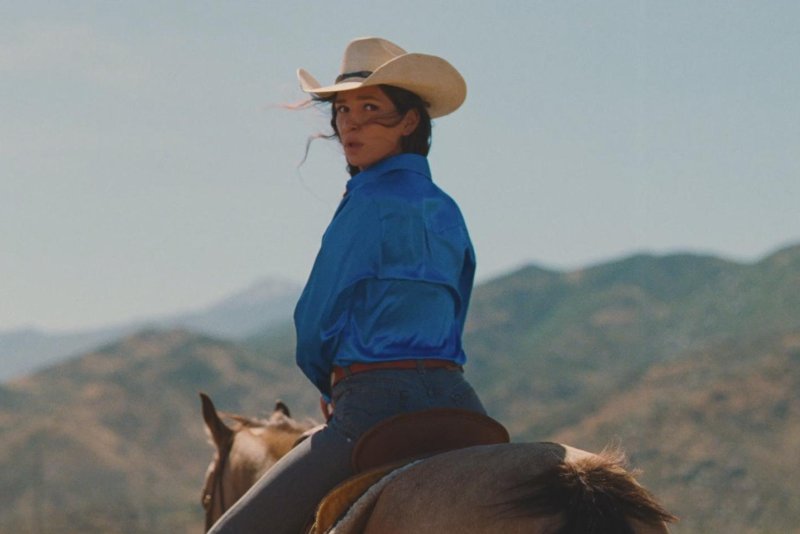After making waves on the festival circuit, including a standout appearance at South by Southwest earlier this year, longtime music video director Luke Gilford’s debut feature National Anthem has finally hit theatres across North America. And with it, actor Eve Lindley is poised to break out.
In this exploration of the queer rodeo circuit—loosely based on Gilford’s photo book of the same name profiling members of the International Gay Rodeo Association—Lindley plays Sky, a buoyant and sexy trans woman who trains horses at the ranch of Pepe (Rene Rosado). Sky has a torrid love affair with Dylan (Charlie Plummer), a day labourer on the ranch who is stuck in an uninspiring reality. By experiencing the freedom and exuberance of the queer rodeo, Dylan is able to connect with new parts of himself, even if it’s unclear whether or not he ultimately comes away with a queer identity himself.
Lindley animates Sky with an energy all her own. Her performance is as memorable for the carefree and electric attitude that she exudes as it is for the depth that she brings to what is a very emotionally rich, demanding role. It very much opens up a new chapter in Lindley’s acting career, as she explores quite different terrain from past performances in projects like the Katie Holmes–helmed film All We Had (2016) and the TV series Dispatches from Elsewhere (2020) opposite Jason Segel, as well as a small but charming role in Bros (2022).
I caught up with Lindley to talk about what it’s like to represent a community through your art, how she felt about filming a queer threesome in the wilderness and how playing Sky helped her find new dimensions to herself.
Could you give me an introduction to Sky and who you see her to be?
Gosh, Sky is so hard to describe. She’s an enigma, she’s kind of mysterious. I guess the most succinct way to describe her would be to say she’s a very genuine cowgirl, and kind of ranch mother.
I was definitely getting that motherly energy from her. That was one of the cool things about Sky, that she brings this motherly energy to all of these people finding themselves in this queer rodeo. As you were looking through the script and thinking about if this was a role you were interested in, what was really speaking to you about Sky?
There were phases to it. In the first phase, I was just like, “Oh my God, I would get to learn how to ride horses!” I love animals, and I’m always excited as an actor to do something new and add it to my list of things.
So, that was like the first phase. And then, in a deeper way, I was very excited at the prospect of being this free spirited, sexy woman. That wasn’t something I’ve always seen for myself as an actor. I’ve tended to gravitate toward these funny roles, and even though I’ve played romantic leads before, I’ve never been so deeply sexual before on camera. I really wasn’t sure if it was going to work, but they kept asking me to send tapes, and ultimately I was really seduced by Sky; I was just like “I’m not willing to give up on this.” I really wanted to find her freedom. She’s so in her body, and I spend a lot of time in my head—I wanted to experience what it’s like to really be that in my body and that confident.
I feel like you speak for a lot of people when you say that. And I think that’s one of the nice things about a lot of the really good trans roles that I see on TV and film these days—these girls can be really very free in their bodies, in a way that I think can sometimes feel hard to access in day-to-day life.
On the topic of bodies, I wanted to ask you about the sex in National Anthem, since this is a really sexy film. What it was like to be working on those kinds of levels?
I had only done, like, one sex scene before, with Jason Segel, and it was really a bizarre thing—it was so surreal, we were on a rotating platform, there were feathers flying everywhere. And it was also just from the shoulders up, neither one of us were even fully nude. So it was a really different experience than this movie.
For the big scene in National Anthem, [director] Luke [Gilford] really wanted it to be a real portrayal of intimacy. Renee, Charlie and myself, we all had boundaries that were honoured, which was really wonderful. We had a fantastic intimacy coordinator.
I felt very taken care of, and by the end of it, it was kind of fun. We were all out in the desert in our skivvies, kind of like huddling together for warmth. When you’re with somebody day in and day out on set, it does sort of start to feel like, “Oh, these are my friends, these are my family.” We got to do what I think is a very beautiful scene.
If you’re going to pick a movie to feel really safe doing a scene like that, it’s probably a movie with such a big, diverse queer cast.
Absolutely. I have to say, I’ve been so lucky in my career, I’ve never really been made to feel uncomfortable in those sorts of ways. And National Anthem was another really great experience with attention to my comfort level.
Do you have a particular favourite scene from the movie?
Oh my gosh, I really love some of the little shots in the movie where I’m playing with the horse and doing the tricks. Those were really fun because they were the moments where Sky felt like she was second nature for me. I wasn’t saying lines or anything. I was just sort of embodying her.
I’m picking up on a lot of these experiences of embodiment of freedom, that this character really spoke to you on this bodily level. Is there something of Sky that you’re carrying forward with you now that the movie’s done with?
Yes, definitely. The thing that Sky has is a community that is able to reflect her back to her, so she can really see herself clearly through these people. Before I made this movie, I was very much living in New York City and I was a bit of a loner there; now I live in LA and I’m part of an amazing community. I have, like, really exciting relationships. I texted Luke the other day and said, “You know, my community finally saw the movie and they reflected back to me such positivity. It felt really amazing, and thank you for the gift that is Sky because I carry a piece of her with me every day.” I really like to be changed by the people I play, and sometimes it’s not until the project is over that I’m like, “Oh, that’s why that was important.” I was really feeling that with Sky.
Since this is a movie that is so much about queer community and finding your own community—even in unlikely places like the rodeo, which I personally did not see coming—I’m curious what community means for you.
Honestly, I still feel like it’s new for me because I’ve always had like friends in different places, but to really have like a group of people who love each other that you’re a part of, this is still something I’m getting used to. It doesn’t feel like you’re this speck of dust flying through the air, it feels like you’re tethered to something. You just feel stronger with other people around you.
How have people responded to your portrayal of Sky?
I think people are enjoying it. I’ve been told by some trans women that it was really moving to see such an embodied character onscreen. It’s an embarrassing thing to say, but doing this role has given me a newfound love of the queer community. I mean, now I can say that I should have always loved the community, but I think for a long time I had been kind of stuck in this idea that “I’m an actor and I don’t have this responsibility to anyone but myself.” And I think that’s true to some degree—I just want to be an actor and not have to speak for a group of people—but, I also feel like the pressure to represent can be a privilege. I’m gonna get stuff wrong, and hopefully I don’t get anything super wrong, but again, it’s a privilege. I’ve never really felt like an activist or anything, I just want to tell stories. But hopefully, with the right stories, my art can be my activism. And hopefully I don’t fuck it up.
I’ve noticed that there’s been a lot more really good roles for trans women in particular recently. There are a lot of stories that are a lot more nuanced, a lot more complicated, that are really holding the transness in a way that feels very different from the generation of films even like 10 years ago or 20 years ago. I am curious to hear your opinion on this, as someone who is on the inside of making this shift in representation happen.
For me it’s really complicated because I have so many friends in the business who can’t make their insurance minimums and aren’t even able to find work. And I agree that there are all these roles that are more nuanced and interesting, but it’s also, like, there are so many people who are unable to get jobs right now. It’s tough. I feel so lucky to get to play the nuanced roles, and I feel like hopefully there will be more. I have this sense that there’s not enough, and I wish that everyone I knew in this business could get to play the kind of roles that I get. To be an actor is not always very sustainable for sure, it’s very feast-or-famine. It’s very challenging, and every now and then a really wonderful role comes your way, and you feel so lucky.
This interview has been edited for length and clarity.
National Anthem is playing in select theatres now.


 Why you can trust Xtra
Why you can trust Xtra


